
For Shamira Lukomwa, working in Africa is personal. It was this passion that led Lukomwa to take what she learned as a double major in global studies and communication studies at the University of North Carolina at Chapel Hill to the streets of Nairobi, Kenya, where she uses art to empower ordinary Kenyans.
“My interests are in East Africa because of my roots there,” she explained. A first-generation American, Lukomwa was born in New York just one year after her parents emigrated from Uganda and, when it was time to apply to college, it was two Ugandan-American alumnae that convinced her to explore UNC.
“Growing up I felt like I really didn’t get to explore African history or African current events,” Lukomwa explained, and she wanted to learn more about her African roots.
Her time at UNC allowed her to do just that, as well as accumulate experiences learning about international aid, particularly in East Africa. While an undergraduate, she took courses on African politics and society, her favorite of which was Music as Culture: Media and Social Change with Chérie Rivers Ndaliko. Lukomwa appreciated Ndaliko’s teaching style and creative use of sources, as well as the way the course united her interest in Africa with her interest in how art can prompt social change.
“The class was rooted in history, which is very important with studying the continent,” she added. “Too often analyses of Africa fail to acknowledge how its history [of colonialism and neo-colonialism] affects the continent today.”
Lukomwa also received a Carolina Experience Enrichment Scholarship to work at an orphanage in Uganda and interned at both the Center for Global Initiatives (CGI) and Carolina for Kibera (CFK), a project of CGI that sponsors economic, educational, medical and youth empowerment initiatives in the Kibera slum of Nairobi. Lukomwa first encountered Carolina for Kibera while studying in Nairobi through the School of International Training (SIT). She was impressed by the organization’s work and proud to see an example of UNC’s global reach.
“It was interesting because there are so many organizations working in Kibera…but CFK is one of those organizations that if you were to ask someone in Kibera if they’d heard of Carolina for Kibera, they’d be like ‘Yes, yes, I’ve heard of it,’” she recalled.
After seeing CFK’s work in person and making personal connections with its staff during her internship at CGI, Lukomwa interned there her senior year. The group was a small one, with only a few people working at its Chapel Hill office, but Lukomwa liked how the organization’s size afforded her the chance to work on a wide range of initiatives. During her time at CFK, Lukomwa worked on design, donor relations, management, producing annual reports and planning fundraising events, including an initiative where the UNC women’s soccer team conducted a skills clinic for girls in the Triangle.
The internship prepared her for a post-graduate job working for arts-advocacy group PAWA254. The organization, which is based in Nairobi, plans events, teaches classes and provides working spaces for young artists creating art with a social impact. Lukomwa was inspired to work at PAWA254 by her friendship with the members of the band Sarabi, who she met during her time in Nairobi with SIT.
“I thought ‘I really want to work for this organization. I don’t know how I’m going to work for them, but I’m going to work for them,’” she recalled.
Lukomwa served as director of their communications and marketing department. In addition to heading all of the organization’s social media campaigns and its rebranding, she helped manage the PAWA Festival, the first and only public street festival in Nairobi, which features art and performances by East African artists. Events like the festival allow “people from all walks of life to experience art for free,” a fact which is Lukomwa believes is critical, because art allows people to learn about social justice issues in a quick and easily digestible way.
“The arts are really powerful and I believe they’re so transformative because they’re so accessible,” she explained, adding that, “the average person is more likely to listen to a three-minute song than watch a three-minute video explaining their voting rights.”
Though Lukomwa enjoyed working for PAWA254, she returned to the United States after a year to focus on applying for graduate programs. She hopes to study non-profit administration in order to learn how international organizations work and found her own non-governmental organization.
Lukomwa urges students interested in international work to pursue as many different opportunities as possible at CGI and UNC in general, as well as network with professors that share their interests. Success, she says, depends upon “not being afraid to take a leap.”
“It’s about having an open mind and not being afraid to be a little uncomfortable sometimes.”
By Sasha Gombar ’17, UNC Global




